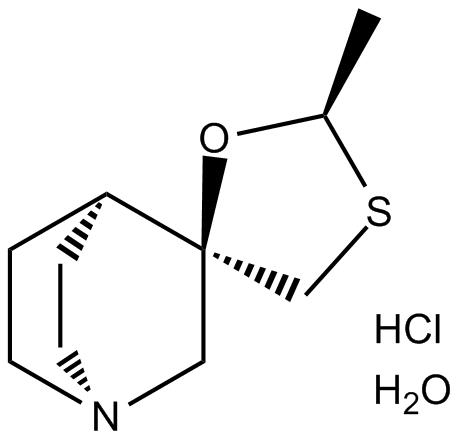Cevimeline hydrochloride hemihydrate |
| Catalog No.GC17157 |
Products are for research use only. Not for human use. We do not sell to patients.

Cas No.: 153504-70-2
Sample solution is provided at 25 µL, 10mM.
Cevimeline hydrochloride hemihydrate is a novel and selective agonist of muscarinic acetylcholine receptor [1].
Muscarinic acetylcholine receptors (mAChRs) are acetylcholine receptors and mediate serous-saliva secretion and tear secretion. It is more sensitive to muscarine than nicotine [1].
Cevimeline hydrochloride hemihydrate induced contractions of isolated guinea pig ilea and trachea with EC50 values of 3.5 and 3 μM, respectively. Binding studies indicated that Cevimeline hydrochloride hemihydrate was a potent and highly selective M1-type muscarinic agonist. Also, it had a higher affinity for M1 receptors than other M1 agonists [2].
In normal rats and mice, X-irradiated saliva secretion defective rats and two strains of autoimmune disease mice, intraduodenal administrations of SNI-2011 (3-30 mg/kg) increased saliva and tear secretions in a dose-dependent way, which suggested that Cevimeline hydrochloride hemihydrate directly stimulated muscarinic receptors in salivary and lacrimal glands for saliva and tear secretions [1].
References:
[1]. Iga Y, Arisawa H, Ogane N, et al. (+/-)-cis-2-methylspiro[1,3-oxathiolane-5,3'-quinuclidine] hydrochloride, hemihydrate (SNI-2011, cevimeline hydrochloride) induces saliva and tear secretions in rats and mice: the role of muscarinic acetylcholine receptors. Jpn J Pharmacol, 1998, 78(3): 373-380.
[2]. Fisher A, Brandeis R, Karton I, et al. (+-)-cis-2-methyl-spiro(1,3-oxathiolane-5,3') quinuclidine, an M1 selective cholinergic agonist, attenuates cognitive dysfunctions in an animal model of Alzheimer's disease. J Pharmacol Exp Ther, 1991, 257(1): 392-403.
Average Rating: 5 (Based on Reviews and 30 reference(s) in Google Scholar.)
GLPBIO products are for RESEARCH USE ONLY. Please make sure your review or question is research based.
Required fields are marked with *




















